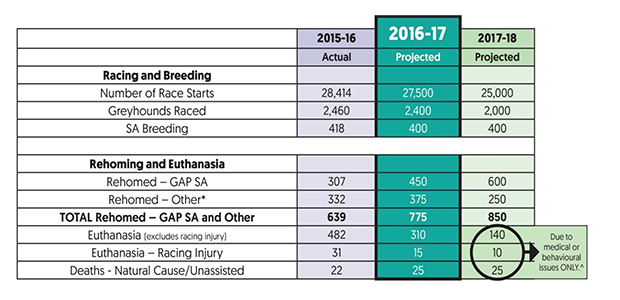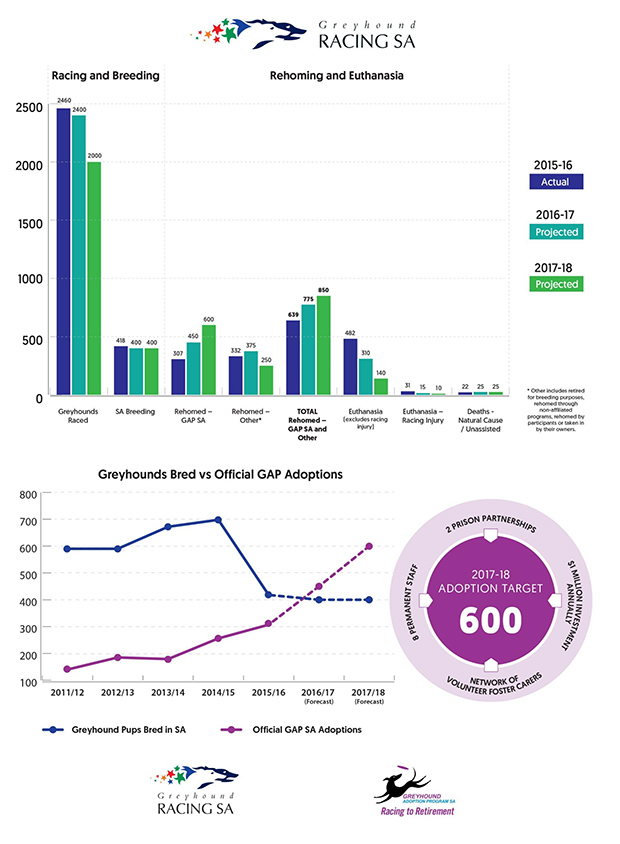MEDIA STATEMENT - 21st September 2016
MEDIA STATEMENT
Wednesday 21st, 2016
Mr Matt Corby – CEO Greyhound Racing South Australia:
“Greyhound Racing South Australia (GRSA) is committed to ensuring that animal welfare outcomes remain the central consideration in all of its decision-making. The South Australian greyhound racing industry and its participants embrace their fundamental obligation and commitment to achieve full rehoming of unraced and retired greyhounds by mid-2018.
GRSA is a clear national leader on this front, and has been a strong advocate for a national strategy of full greyhound rehoming well prior to any national issues arising.
We will invest more than $1 million annually in support of our Greyhound Adoption Program, with our target of 450 greyhound adoptions in the current year being supported by eight permanent staff, two prison foster care programs and a small army of dedicated volunteer foster carers behind the scenes.
Over the past 18 months, in addition to our investment in greyhound rehoming, GRSA has established a dedicated fund to subsidise veterinary care of racing-related injuries, employed seven new full-time staff in inspectorate and welfare-related roles, contributed to amendments to the Animal Welfare Act, installed video surveillance at unmanned trialling facilities, and introduced racing opportunities for greyhounds of all standards. In the coming six months, all registered participants will undergo Certificate II training as a condition of ongoing licensing.
No racing code in any state spends a higher percentage of its revenue than, or delivers superior rehoming and welfare outcomes to, GRSA.
Greyhound racing in South Australia generates an economic impact of $50 million to the South Australian economy and directly employs or engages more than 4,000 workers, participants and volunteers.
Our industry believes that it can only begin to meaningfully move forward by making its primary breeding and euthanasia data publicly available. Further speculation and misinformation regarding GRSA’s performance in the area of animal welfare can only be counter-productive to the good work that we are doing to achieve our rehoming targets”.
For further information: Media and Communications Cathy McHugh 0412-515-819
BACKGROUND:
During 2016-17, GRSA will invest more than $1 million in support of its rehoming efforts and through our Greyhound Adoption Program (GAP SA) we will become the first Controlling Body program to rehome more greyhounds than its local industry breeds.
The South Australian greyhound racing industry and its participants embrace, as its fundamental obligation, a requirement to achieve full rehoming of unraced and retired greyhounds. GRSA is a clear national leader on this front and has been a strong advocate for a national strategy of full greyhound rehoming well prior to any national issues arising.
We will continue to report annually on our performance against the targets that we have set so that our efforts are underpinned by transparency and accountability.
GRSA has committed both the funding and the resources to support the realisation of rehoming opportunities for all greyhounds in South Australia by mid-2018. In line with the approach of other welfare organisations, the definition of ‘full rehoming’ excludes euthanasia undertaken for medical, behavioural or legal reasons only.
GRSA’s current performance and future targets constitute best practice in racing and will set the standard for others to follow.
Greyhound racing in South Australia generates an impact of approximately $50 million on the state economy and directly employs or engages more than 4,000 workers, participants and volunteers. The code plays a key role in driving the social fabric of the regional communities that it supports and constitutes a legitimate recreational activity for the tens of thousands of South Australians who attend or wager upon the 350 race meetings conducted annually in this state.

* Other includes retired for breeding purposes, rehomed through non-affiliated programs, rehomed by participants or taken in by their owners.
^ Projected number of unavoidable deaths due to natural causes, medical issues or temperament issues that would prevent responsible rehoming

